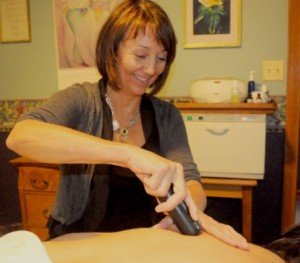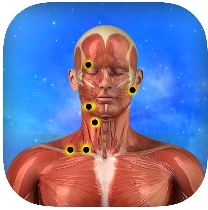
I have been a NY Licensed massage therapist since 1983. After 5 years of solo practice my clientele grew to the point where it was necessary to open a group practice. Three years later, I opened a second location where we offered massage, acupuncture, skin care, psychotherapy, and reflexology.
Both locations were very successful and I started to feel like I was spread too thin because not only was I working with clients 5 days a week but managing 15 other therapists at two locations. I sold The Wellness Center to two of the massage therapists who were working for me and focused my energy on my clients and one small group practice.
Presently, I am working from a space that we built on my home property. It is separate from my home so I still have my privacy and I work with 3 other massage therapists so I can better serve the community and also make an income when I am not in the office.
2. Tell us why you chose to go into massage and at what point in your life did you decide to do so? What were you doing at the time? Where did you first hear about the massage career? What factors influenced your decision? What were you looking to get out of this decision?
I was living in New Mexico when I first heard about the profession of massage. A friend was going to massage school in Santa Fe and when she told me about her studies I was intrigued.
I went home to New York for a visit had an astrological reading – this astrologer told me I had a Nova in my chart and that represented ‘the administering of healing’ and said I would most likely get involved in a profession that was out of the ordinary. When I told her I had been considering massage school she strongly encouraged me to pursue that idea.
The rest is history! I had no idea at that time how this decision would so greatly impact my life. When I enrolled in massage school I was a single mother with a three year old and very little financial support. I was able to find a progressive day care for my son and a weekend job waitressing. It was a struggle, but we got through it and my effort was rewarded with a fabulous lifelong career.
3. What were some of your questions and concerns before further pursuing your massage therapy goals? Talk about concerns with school and the profession itself.
At the time I went to school, in 1981, massage therapy was virtually unknown. Most people raised an eyebrow when I said I was a massage therapist and the general impression was that I was one step away from prostitution. I worked diligently to educate the public and was fastidious about professionalism.
4. What is your specialty and what are the top three contributing factors to your success today?
My specialty is listening – listening to my client and listening to their body. Sometimes I say that I am listening to the voices in my head because there is an inner knowing or intuition that will send me somewhere and a client will say ‘how did you know it hurt there’ or ‘I didn’t even know that area was a problem but I can feel how it is related to the pain in my shoulder (or wherever)’.
My work ranges from the feather touch of CranioSacral Therapy to the deep pressure of Ashiatsu or CoreStone massage. I have bars on my ceiling so I can use my feet if necessary.
Top three contributing factors to my success:
A. In my 33 years as a massage therapist I continually take classes to improve my skills and keep my work.
B. I am generous with my time and do good work. I schedule an hour session in a 90 minute spot so the client isn’t stressed if they are running a few minutes late, so they can feel relaxed after the session, and in case I run into anything that requires me to work a little over the time allowed. I’m not going to stop as the clock strikes 12 just because their time is up.
C. My office is like an oasis where people come to de-stress. From the moment they drive in the driveway they start to decompress – there is a lovely view of the mountains, a little pond with a waterfall and fish, and beautiful gardens. The interior was professionally decorated to induce a feeling of relaxation and the scent of essential oils permeates the air.
5. What do you like about your specialty? What do you like about what you do in general as a career? Why?
I love the satisfaction I get from helping to relieve someone’s pain. I like to figure out what factors are contributing to the pain – it’s not always the obvious. The relationships I develop with my clients are very special to me. I have been working with some clients for over 20 years – we’ve been through marriages, births, deaths, changes in career, etc.
6. What do you not like about what you do? Why?
There is a limit to the amount of sessions you can do in a day and therefore a limit to the amount of money you can make with your hands. If I’m not feeling on top of my game, doing massage can be physically exhausting and when I am going through difficult emotional times it is hard to listen to someone else’s troubles. There is a flip side to this though because I find that even when I’m tired or depressed or sad, when I go to work and get the attention off of myself, my day gets better.
7. If there were three things you could change about your work or the industry as a whole what would they be? Why would you change them? What would you change them to?
I would like to see the average rate for a massage reflect the amount of work that goes into a session. Think about our hourly wage compared to other health professions. I do understand that our hours of education differ from state to state and we can’t compare a 500 hour training program to a doctorate degree but there should be recognition for the years of experience and continuing education that a therapists has.
I’d like to see different levels of achievement equivalent to a Bachelor’s Degree or Master’s Degree. Our training is too generic at this time.
Reciprocity from state to state would be another change I would like to see happen. This would require a standardized level of education and would make it easier on a therapist to continue to do the work they love when the move to another state. Presently, moving into NY is a nightmare for anyone licensed in another state. Years of experience and CE should be factored into the present rigid requirements.
8. How long do you plan to practice and what do you plan to do after?
I don’t have a plan for this. I will see what the future holds. I don’t see retirement in my near future, even though I’m 61 years old. I can’t afford to retire and I’m still able to work – so I’ll see how it all plays out. I do find that I do fewer massages now than I did when I was in my 30’s or 40’s.
9. Do you currently have another job or business whether full time or part time? Tell us a bit more about it and how you are able to juggle that with your massage career?
In 2011 a friend and I created a product called CoreStones. CoreStones are a cylindrically shaped soapstone massage tool used for myofascial release, trigger point release, muscle stripping and reflexology. In addition to launching this business by attending trade shows, fulfilling orders, and marketing the product I teach a course called A Therapeutic Approach to Stone Massage to other licensed massage therapists.
I’m a nationally approved provider of continuing education and teach classes all across the country. This makes my life quite full and I do find it difficult to juggle it all. My hope is that CoreStones, Inc. will become a huge success and I will see great profit. Then I will mostly retire from massage, hire enough people to ease the burden from my shoulders and take more vacations! Oh, and live happily ever after….I forgot that part.
10. What are some mistakes you made in your career pursuit that you’d like to warn other students about so they can learn from your experience and avoid it?
When you begin to expand your practice and hire other therapists or independent contractors there are many factors to consider. First, there is a difference between employee and independent contractor and it is important to do your research in this area. Then, when you have therapists working with/for you and they develop a clientele they will be tempted to move out on their own with the clients. This is inevitable. At one point I did have therapists sign a ‘non-compete agreement’ – again, do some research about this type of document. I don’t want to give too much advice because it is not my area of expertise; I can only speak from experience.
You also have to look into things like disability insurance, workers comp etc. if you have therapists working with you. It can be a bit of a mess and raise red flags with the IRS if not done properly.
11. What would you advice someone who is looking at massage therapy schools? What do you recommend they look for and how? How do you recommend they determine whether the school is the right one for them?
I would recommend that you ask around about the reputation of the school. Talk to recent graduates about their experience. In states that require a license you must be sure that the school you enroll in is recognized by your state board. And of course, visit the massage school to get an energetic feeling about the environment. This may sound silly to some, but you will be spending a lot of time there and our bodies are sensitive to the energy we are surrounded by.
12. What do you recommend for someone who wants to go to massage school but cannot afford it?
That’s a good question – I don’t have an answer to this one. I would hesitate to tell someone to go into debt to get into massage school because there is no guarantee that they will be successful as a therapist. I have seen too many people go through school and not stay in the field.
13. What are your three biggest points of advice for an aspiring massage therapist today? What should they do/not do? What should they think about and consider?
There are so many therapists now – it’s very different from when I started. I was a big fish in a small pond. Therapists now have it easier in some ways, because there has been so much research about massage and the public has a better understanding of our profession. On the other hand, the competition is greater. I think it is prudent to find a niche in massage that sets you apart from other therapists.
Think about what is going on in our world and what that could mean to your career. With the increase in cancer, oncology massage is an emerging specialty or lymphatic drainage. There are so many more senior citizens now with all of the baby boomers blossoming into their golden years – so geriatric massage could be an area of focus. Or with so many people involved in fitness another specialty could be any type of massage that focuses on injury or stretching.
14. Any open thoughts / comments – anything else that you’d like to share about yourself, the massage industry, profession, future, etc? If nothing, make one prediction for the future of massage?
I’m a bit concerned about the corporate take-over of so many massage schools. The small privately owned massage schools are being over-powered by the money making corporations and the quality of education could suffer from this.
Massage therapists are one of the few health care professionals that take time with each client/patient to listen to their concerns and TOUCH them. So many clients express that they went to the Dr. with a complaint about a pain and the doctor didn’t even touch them – they were sent away with a script for muscle relaxants or pain medication.
I hope we can maintain the soul of our profession and not get caught up in the gears of the greed machine.
15. What is your passion outside of massage? What are your hobbies and interests which you pursue when you are not working? Tell us why you enjoy what you enjoy.
When I’m not doing massage, teaching massage, or working a booth at a convention, I LOVE to ride my bicycle! Every year, on my birthday, I bike my age. This year it was 61 miles. At some point, I will decide to only bike ‘how many more years until I’m 100’ because I don’t think I will be able to bike 100 miles when I’m 100 years old.
I also enjoy working in my yard and gardening. I split and stack my own firewood and love the feeling of total exhaustion after a day of physical labor in my yard. I’m blessed to live in one of the most beautiful areas where hiking and cross-country skiing are not only available but not to be missed.
Travel is also a passion of mine – my most recent trip was to Peru – where I went on a spiritual journey with shamans. There are so many places I want to experience before I take the great journey to the other side.
Dale Montelione Grust, LMT is a NY Licensed Massage Therapist, a NCBTMB approved provider of Continuing Education and a Certified Infant Massage Instructor. She is the Owner/Director/Therapist at the Center for Therapeutic Massage in New Paltz, NY and the Co-Founder of CoreStones, Inc. You can reach her here and here or on her professional Facebook page here.








Is regular basis massage therapy covered by Husky D CT insurance.